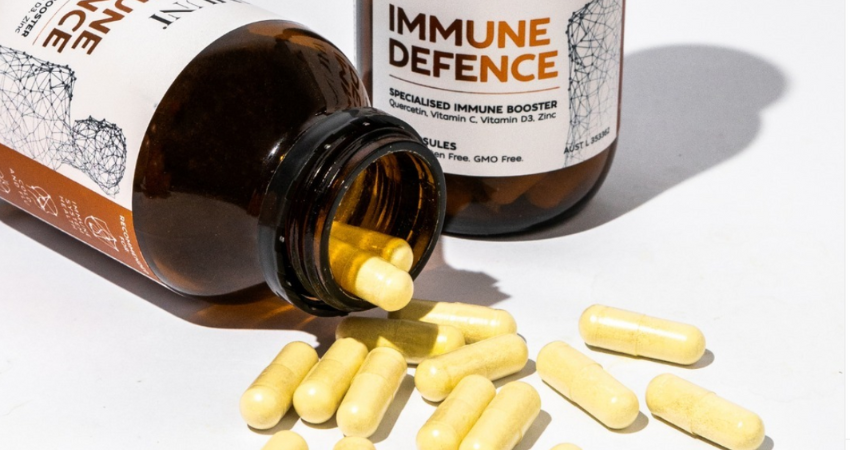It can be difficult to know what supplements to take, but Imuni Immune Defence is a great choice for several reasons. It helps your body fight the cold and flu season, while also keeping you healthy in general. Let's break down the ingredients in this beautiful formula.
Imuni Immune Defence is a special formulation aimed at supporting a healthy immune system as well as combating cold and flu. This formula is free from animal products, artificial colours, flavours or sweeteners, gluten, lactose, dairy, nuts, soy, sulfites, added sugars or GMO ingredients and is also vegan friendly. The recommended daily dose of Imuni Immune Defence (two capsules) contains zinc, vitamin C, quercetin and vitamin D3. Let's explore each ingredient and its importance for a healthy function of our immune system.
.png)
Immunity is a complicated process that involves your body's immune system, but there are lots of other things that can affect it.
The immune system is made up of different cells and chemicals that work together to protect you from diseases and infections. It fights off germs that can make you sick, like bacteria and viruses, helping you stay healthy.
There are a lot of things that can affect your immune system, including your lifestyle choices (like eating well or getting enough sleep), the environment around you, and even your family's health history. But there are also some medical conditions or diseases where the immune system may not be working properly and may need treatment with medicines like antibiotics.
Immune defence is the body's natural way of protecting itself from harmful organisms and substances. It also fights off infections and helps to heal wounds.
The immune system includes:
(2).png)
It is a common fact that our immunity is in a constant state of decline due to various factors such as stress, pollution, bad eating habits and lack of sleep. In order to maintain your body's ability to fight infections, you must increase your immunity by eating healthy and getting enough sleep.
How to increase immunity?
The first step towards increasing your immunity is by eating a healthy diet. You should try to avoid junk food as much as possible and eat plenty of fruits and vegetables. These foods are high in vitamins and minerals which will help boost your immune system.
Also avoid processed foods as much as possible because they are often filled with harmful chemicals that can weaken your immune system over time.
In addition to eating right, getting plenty of sleep is also essential for boosting your immune system. If you don't get enough sleep at night then it will affect how well you function during the day when there are so many things going on around you (especially if you have children). It's important that we all get enough rest so that our bodies can function properly throughout the day without feeling tired all the time!
Here are the top supplements to boost your immunity.
Let’s explore those supplements in more detail below!

Vitamin C is an essential nutrient that helps keep your body healthy. It's an antioxidant and it helps the body absorb iron. This is particularly important for those on vegan and vegetarian diet. It's also good for skin health, eye health, oral health and immune system health.
Vitamin C may help shorten the duration of a cold, according to some studies. There is currently no evidence that vitamin C supplements can prevent heart disease, but there is some evidence that high doses (1 g per day or more) could be beneficial for people with existing heart diseases.
Vitamin C is also known as ascorbic acid. It's an essential nutrient that helps keep your body healthy. Vitamin C is a water soluble vitamin found in many foods, including citrus fruits such as oranges and lemons. You can also take supplements like vitamin C powder to get enough of this important vitamin. According to the Australian Government, Vitamin C RDI is 45 mg for adults, while breastfeeding women need more, around 85 mg per day. Vitamin C for kids is recommended in smaller doses, around 35 mg to 40 mg per day. Vitamin C in orange contains about 59 mg of vitamin C per 100 grams. One medium orange delivers 83 mg of vitamin C.
Vitamin C is best known for its ability to prevent or treat scurvy, which is a condition caused by a lack of vitamin C. Other health benefits of this nutrient include helping with wound healing and preventing colds. Vitamin C has many important functions in your body, including helping to make collagen, an important protein for skin health.
(1).png)
Vitamin D is an essential nutrient that plays a role in the body's immune system, bone health, muscle growth and strength, brain function and eye health. In fact, vitamin D may also help prevent heart disease. It is estimated that more than 1 in every 3 Australian adults has mild, moderate or severe vitamin D deficiency.
Vitamin D deficiency has been linked to many adverse health conditions including cancer and cardiovascular disease (heart disease). A study published in the American Journal of Clinical Nutrition found that people who were deficient in vitamin D had a greater risk of dying from any cause than those with sufficient levels of this nutrient at baseline. A meta analysis published by the British Medical Journal showed that low levels of vitamin D were associated with an increased risk of developing multiple sclerosis.
Is vitamin D from the sun better than taking supplements? There's also some debate about whether you can get enough vitamin D through the sun. Although it depends on where you live, how long you're exposed to sunlight (and without sunscreen), your skin colour and age, experts agree that natural sunlight is a good way to get this nutrient, however you need to be mindful of uv rays and the length of sun exposure.
When sun exposure is minimal, vitamin D intake from dietary sources and supplementation of at least 600 IU per day for people aged under 70 years and 800 IU per day for those aged over 70 years is recommended. People in high risk groups may require higher doses.
Vitamin D is an important nutrient that plays a role in immune function, bone health, muscle health and more. In order to get the most benefits from this vitamin, you should aim for adequate levels of vitamin D in your body. If you're deficient in this nutrient, then it may be time to consider supplementing with a multivitamin pill or other source of vitamin D such as Imuni Immune Defence formula.
How to check for vitamin D deficiency? The most accurate way to check if you are vitamin D deficient is to do a blood test. A level of 20 ng/mL to 50 ng/mL is considered adequate for healthy people. A level less than 12 ng/mL indicates vitamin D deficiency.
.png)
Quercetin, a bioflavonoid found in many fruits, vegetables and herbs, is a natural antioxidant that helps prevent cell damage caused by free radicals.
The benefits of quercetin are numerous. In addition to providing protection against viruses and bacteria, it may help reduce blood pressure and cholesterol levels in the body. Quercetin also has been shown to reduce inflammation associated with arthritis, asthma or other conditions that cause inflammation.
Quercetin is also found in many foods. Quercetin can be found in apples, onions and other red fruits; tea leaves and cocoa beans; soybeans, sauerkraut and rhubarb. Other than finding quercetin in foods, this flavonoid is also available as a dietary supplement.
Quercetin is found in many plants, especially the skins of fruits. It has been shown to protect against cancer and other diseases by neutralizing free radicals in the body. The most common form of quercetin is called quercetin-3-glucoside (Q3G) and it's found in apples, onions and other red fruits; tea leaves and cocoa beans; soybeans, sauerkraut and rhubarb. Buying quercetin in Australia in a supplement form is easy from retailers like Sassy Organics.
Quercetin and zinc work together to help your immune system fight off viruses and bacteria that may cause illness. They also provide natural anti inflammatory properties, which means they can help reduce swelling and pain in the body's joints, muscles or other areas.
Some of the major quercetin and zinc benefits include anti viral properties and the fact that quercetin will push the zinc into the centre of the cell where the zinc can stop the virus from reproducing.

Immunity is the body's ability to fight disease. It is a complex process involving the body's immune system, which protects against infection and foreign substances. When you are in good health, your immune system protects you from infections and disease. But if you don't build up your immunity with a healthy lifestyle, it can leave you vulnerable to common everyday ailments like colds or flu.
A healthy diet can help boost your immunity by providing more vitamins and minerals that help improve your overall metabolism – this includes eating foods rich in vitamin C (such as oranges), folic acid (like spinach) and zinc (like avocados).
If you are looking for other and easier ways to improve your immune system, try taking this immune defence tablets, a quality immune health supplement with 100% plant sources vitamin D and the world's purest form of quercetin. This formula is suitable for anyone from the age 12 years and up.
If you’re looking for a vitamin that supports your immune system, then Imuni is the right product for you. It offers a wide variety of vitamins and minerals that will help keep you healthy and feeling great.
RECOMMENDED PRODUCTS